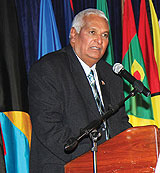|
 After several attempts at Caribbean Integration over the many decades including the elusive West Indian Federation which collapsed in 1962, Trinidad and Tobago’s Minister of Foreign Affairs, Mr Winston Dookeran has proposed a new mantra—Caribbean Convergence. After several attempts at Caribbean Integration over the many decades including the elusive West Indian Federation which collapsed in 1962, Trinidad and Tobago’s Minister of Foreign Affairs, Mr Winston Dookeran has proposed a new mantra—Caribbean Convergence.
He told the United Nations Economic Commission for Latin America and the Caribbean (UNECLAC) during an official visit recently to Chile that the real issue now is about, “fresh thinking and innovative ways of moving the process beyond Caribbean integration to Caribbean Sea Convergence.”
“This Convergence Process, similar to the ASEAN model, offers greater flexibility, scope and benefits for the Caribbean Sea economies in responding to emerging global challenges to capture a new frontier space,” he said.
Accordingly, we present this strategy framework that provides a new political and economic life in the process of Caribbean Integration. “The initiative is not to supplant the Caribbean Integration Movement, but to reinforce it with some innovative ways of moving the process forward that is understood as Caribbean Convergence to create an economy of the Caribbean Sea.”
Minister Dookeran pointed out that as we search for more economic space, Caribbean Convergence is an issue that we need to look at in the context of an ever-changing global arena. “Furthermore, this new economic convergence process will have to confront the political challenges and redesigning of the economic and financial architecture. It is a challenge to drill down for development—how we can move from the macro-economical frameworks; into the drilling down frameworks; into the making-it-happen framework; into the getting-results framework.
STRATEGY FOR CONVERGENCE
Mr Dookeran said that against the backdrop of the discussion on the nature o the emerging global political economy, “we need to reconsider and review the Caribbean region’s strategy in adapting to new global realities.” He continued: “What should be CARICOM’s response to these global shifts? Is there any viable strategy to move forward? In the ensuing discussion, we provide a new strategy of ‘Caribbean Convergence’ as the region’s strategy for moving forward.”
Although CARICOM was a political concept from its inception, it has become an economic project, he noted. The Caribbean institutions are ‘enslaved by the methods of the past’ and ‘paralysis in thinking’. “It is no longer economically workable. The logic of economics that drove the project has been trade and markets. However, the convergence argument here is that trade and markets should be buttressed by production, distribution and competitiveness.”
The former Finance Minister pointed out that the real issue is about fresh thinking and innovative ways of moving the process beyond CARICOM integration to Caribbean Sea Convergence.
Dookeran noted that the agenda for a new political economy was identified in 2008 with a call for ‘fresh thinking’ in Caribbean development. Accordingly, we present this strategy framework that provides a new political and economic life in the process of Caribbean integration. “The initiative is not to supplant the Caribbean integration movement, but to reinforce it with some innovative ways of moving the process forward that is understood as, ‘Caribbean Convergence’ to create an ‘economy of the Caribbean Sea’.
Mr Dookeran said that as we search for more economic space, Caribbean Convergence is an issue that we need to look at in the context of an ever-changing global arena. “Furthermore, this new economic convergence process will have to confront the political challenges and redesigning of the economic and financial architecture.
Creating the Caribbean Sea economy is first a politics-driven process requiring a partnership approach. Therefore, the immediate policy requirement is to grant membership to Dominican Republic. The French and Dutch speaking islands have applied for associate membership and should be granted membership. Initiatives need to incorporate French Guyana into the CARICOM framework. These are issues to resolve but not to prohibit.
“What is innovative in this convergence framework is a new form of public-private partnership within an economy of the Caribbean Sea” with a focus on production integration, distribution and competitiveness as supporting trade and markets. Therefore, we need to understand convergence as moving from the limitations of Caribbean integration towards a new frontier for Caribbean Convergence. Convergence is about adding value to the workings of the integration process, and supporting the structures built over the last forty years. This is in line with the call for building regional capacity to global challenges, he said.
—The author is Media Adviser to Minister Winston Dookeran
|
CRNF CEO speaks at exporTT Conference
CRNF CEO and Founder, Arlene Graham, spoke on harnessing the diaspora at exporTT conference in Trinidad and Tobago between October 29 and 30, 2013. “The Caribbean global Diaspora is a powerful, untapped resource for governments and businesses of the Caribbean region”, said Ms. Graham. She further went on to discuss how tapping into the resources of the Diaspora has proven to be elusive. Trinidad and Tobago, as well as other CARICOM nations, have been somewhat successful in promoting trade abroad, as well as cultural, athletic, and exchange programs with the global community. However, tapping the resources of its extended population community has proven to be elusive. The challenge of integration, dialogue, and ongoing communication with the Diaspora however defined is persistent. A few CARICOM nations have found the solution to assist cultivating human capital and other resources that sit waiting at our doors for discovery. Ms. Graham further went on discuss the goals and ways to engage the Diaspora.
|
|